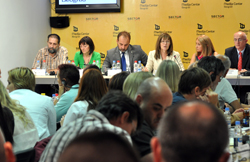
The vicious circle

The recent public presentation of the comprehensive report on the pressure against and control of the Serbian media authored by the Anti-Corruption Council has factually proved what we always knew or suspected, but could not prove: the media have not been independent for a long time and are being pressured by various centers of political power; as a result, citizens are deprived of complete and objective information. A democratic society is unattainable without free media, while at the same time the democratic society with transparent public processes is a necessary precondition for successful fight against corruption – which has become ubiquitous in Serbian society.
Insufficient transparency of ownership and strong connections between the political elite and tycoons' speculative capital that dominates our transitional society – where it is impossible to discern true owners from those who only represent a facade serving the interests of political power – are the causes of the control over the media and the lack of journalistic freedom. During its two-year research, the Council has clearly demonstrated and proved that 18 out of 30 owners of most significant media outlets in Serbia are unknown to the public. The presence of offshore companies registered in Cyprus or Cayman Islands in the ownership structure of these media outlets serves a purpose: to hide their true owners. Why? We can guess that these media outlets have been financed via traditional laundering of money acquired by war profiteering or post-war pillaging of public property. If war and post-war profiteering criminals, disguised as new "businessmen", are the true owners of major media outlets in Serbia, it is
clear what kind of editorial policy they might pursue. Even when the capital invested in the media has not been acquired through criminal enterprise, the identity of actual media byers does matter. There have been many cases when media outlets were bought by people who had never worked in the media scene. For example, few years ago, the local newspaper Pancevac was sold to a dairy factory owner who only wanted to brag about owning "the oldest newspaper in the Balkans". After only two years, the newspaper was brought to near-bankruptcy, many renowned journalists have been fired, while the newspaper's former reputation and quality became only a distant memory.
The political elite in Serbia has been very skillful in using state budget funds to win over certain media outlets. Their editors were often told that they could expect to be later appointed as ambassadors in exchange for their obedience, or punished by being taken off the list of recipients of state budget money if they did not bow to demands. At the same time, marketing agencies (frequently owned by politicians!) that control the advertising market keep buying the advertising space in the media as long as their reporting is in line with certain policy (at the local or national level). As soon as any media outlets diverges from it, the advertising market becomes closed for it. Is it not a fact that a politician from the most powerful political party in the country owns one of these powerful marketing agencies?

The public service broadcaster (RTS) has practically become the mouthpiece of the ruling coalition, as the report authored by the Anti-Corruption Council clearly says. Although the RTS is financed by all citizens via mandatory TV fee (unavailable to other media outlets), its programme is full of advertisements similarly to commercial TV stations. In addition to this, as a member of the Managing Board of the RTS announced during the debate about the Report issued by the Anti-Corruption Council, the RTS intended to demand state assistance in the form of regular allocation of money from the state budget. What kind of freedom of expression can we expect in such conditions?
The problems are clearly evident. During the presentation of the report, the conference hall in the Media Center was full of journalists, including TV crews from various TV stations. However, after the presentation of the report, its media coverage was minimal. Many of the media outlets did not even register it. This fact was the best – although discouragingly sad – proof that the Anti-Corruption Council's report had accurately described our media scene.
Zlatoje Martinov
MC Newsletter,
October 7, 2011
View all comments (0) Leave a comment
Published comments contain opinions that are not the opinions of Media Center. Responsibility for the content of messages and their accuracy lies on the website users who posted them.
 |
| The content of this article does not necessarily reflect the view of the Media Center. The author bear full responsibility for the content of the text. |





